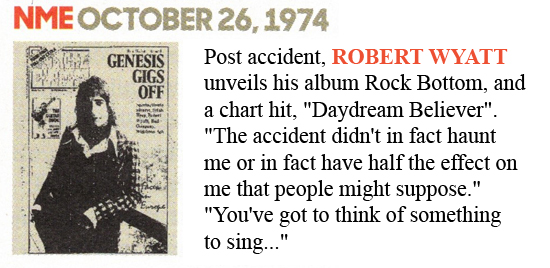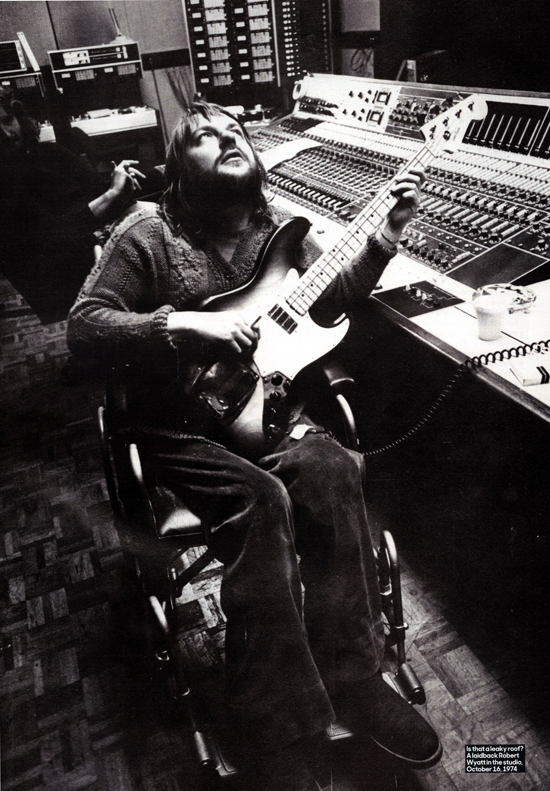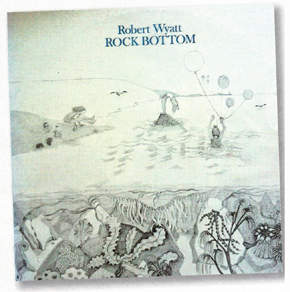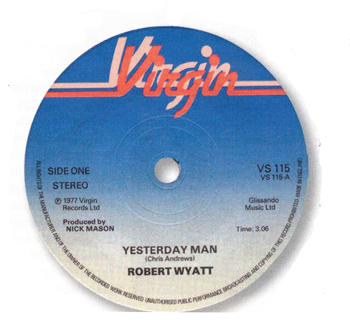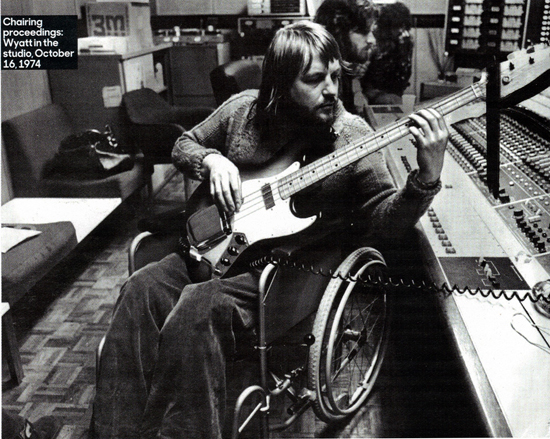| |
|
|
 "I'm not concerned with whining" - The Best of NME 1970-1974 - August 2018 "I'm not concerned with whining" - The Best of NME 1970-1974 - August 2018
|

|
THERE'S something extra special about green suede boots. A certain devil-maycare attitude, a touch of fearless dandyism combined with a sense of the earthy and an instinct for style that just don't quit. Robert Wyatt weareth green boots. They go very nicely with the blue plastic stopwatch around his neck.
Nick Mason, Very Famous Drummer and Producer De Luxe, peers eloquently through the plate-glass barrier between the Shop Floor and Ground Control at CBS studios. On the other side, Gary Windo (fetchingly ceilinged by a little white cap) and Mongezi Feza are adding the horn lines to Mr. Wyatt's Next Teenage Smasheroonie.
"Great," opines Wyatt from his mobile command-post at the doorward end of the console.
"It does a bit, doesn't it?" replies Mason.
Wyatt groans elaborately. "You and your Pink Floyd in-jokes."
The song is another golden great from the sizzlin' Sixties, Chris Andrews' "Yesterday Man". Where Andrews' original was aggressively petulant, Wyatt's is wistfully surreal. He performs on assorted bits of percussion (including a bass-drum whomped by hand) and what sounds like a harmonium, but plays around the beat while the main rhythmic push comes from Windo and Feza.
|

|
A modestly clad young man with an air of amiable vagueness that instantly pegs him as a member of Henry Cow wanders in, identifies himself by the highly improbable name of John Greaves, overdubs a positive humdinger of a bass line, inquires how long it takes to get from here to Liverpool Street, and wanders out again.
"Yeah, but could Pan's People dance to it?" inquires Windo.
It looks as if they may have to, because after a minor fracas with Top Of The Pops' resident plenipotentiary Robin Nash, Wyatt will probably not be gracing their studios for some little time to come.
It seems that Nash considered Wyatt's appearing in his wheelchair to be somewhat "distasteful", both to the audience and to the production team. Wyatt retorted, with ample justification, that if being in a wheelchair didn't hang him up, he saw no reason why it should offend anybody else. Exeunt fuming in opposite directions.
Meanwhile, there's a groovy little ditty entitled "Sonia" to go on the B-side, and for this one Wyatt whips it out on a specially prepared mellotron programmed with sound effects, tuned percussion, voices, xylophones and a whole circus of other foolishnesses. As he gets to work on the track (which already features him on piano and percussion) jaws sag and people run serious risks of falling off their chairs.
"He could do a show by himself with two or three of those," murmurs his wife Alfie.
"Can we hear the other one again?" asks Windo. Mason spins around in his chair, face frozen in well-simulated disgust. "What do you think this is?" he asks icily. "A bleedin' discotheque or something?"
As the studio disintegrates once more into cackles of braindamaged hilarity, we fade out into a different time phase; : two weeks previously in Twickenham, playground of the
Elder Deities. We'll give Wyatt one paragraph's start to make it back to his residence in time to admit the writer.
OK, Robert-go!
WHILE we're waiting, let's sling in a few thoughts on Mr Wyatt's album, Rock Bottom, which is being received in the nation's record stores with the proverbial storm of indifference. First of all, it's an easy album to listen to and a hard one to come to terms with. (Jeez, two clauses ending in prepositions. If my English teacher could see me now.)
As Ian MacDonald pointed out in his original review of the album, rock-star-as-paraplegic is a whole different ball game to the flood of spiritual hypochondriacs currently laying their bummers on paying customers, especially when Wyatt has triumphed over his particular slice of adversity, leaving others (like John Lennon, Lou Reed and pre-Beach Neil Young) staggering under comparatively featherweight burdens.
I don't want to pull any sanctimonious Oxfam there's-a-lesson-to-be-learned-by-all-of-us routines, but nevertheless, the point does have to be made. Not to dwell overlong, either, on the fact that the music and lyrics are a prime vindication of tile theory of lateral thinking as applied to rock music (ie, many of the conventional criteria of what constitutes a "good rock lyric" or a "good rock melody" are effortlessly short-circuited).
There, now. I've gone on for five paragraphs when I only meant to write one, and poor old Robert's waiting for me two weeks ago in Twickenham - so into the conveniently located time/space reducer (cleverly disguised as an ordinary London taxi) and...
Lo and behold, here we are at the Wyatt residence, a large, airy house - reputedly donated by admirer Julie Christie - and here's Mr. Wyatt himself to open the door.
The living room window is adorned with a communist sticker (you just knew that he was a dirty Red, didn't you? Now he'll definitely never get back on Top Of The Pops). Beaming and kaftan-draped, he skids around the kitchen organising coffee ("We don't have any sugar, so is condensed milk all right? You don't look like a hippie, otherwise I'd offer you honey"), before transferring the discussion to the Principal Living Area, which, he claims, "has a totally spurious and extremely temporary air of tidiness."
He produces a reminder list for himself of things that he specifically wanted to talk about. A remark made by the author, to the effect that he never listens to the radio because he likes to programme his own listening, sparks Wyatt off on one of his ready-made topics.
"But the logical extension of that is why not get a piano so that then you can programme your own notes. It's like singing; everybody thinks that it's a case of some people have a voice and some people haven't. Everybody's got an equally good voice. Just like everybody's got two arms and two legs. It's just a matter of using it.
"People who get praised for doing it are the people who actually bother. It's incredible cheek, actually. There's nothing easier than putting on layer after layer of any instrument that you find lying around." Take that, Mike Oldfield. Still,
that does presuppose that you can actually play the goddamn things in the first place.
"No, not assuming that you can play it. In fact, Dave MacRae had a much harder time putting down Mellotron than I did, because he knows much more about possibilities. I'm so delighted if I can get a note which sounds nice that I don't get too flash with it.
"Blokes don't like to admit that many of their heroes became heroes because a lot of girls fancied them"
Dave can do so much that it's almost a drawback. The people who make the best rock records are the people who can't really play that well at all."
"It must be very tantalising for someone like Keith Jarrett, because he can do so much. It's like an athlete: there's such a real joy in doing it. His fingers are so fast that his brain can't keep up half the time.
"People with a fantastic amount of facility have a hard time controlling it for a specific musical event. In fact, amazing soloists tend to play different versions of Their Solo in everything they play. Jazz guitarists have a much harder time playing solos that are relevant to a particular tune than, say, George Harrison would, who can't move that fast. This is my theory, which is my theory and which belongs to me.
"Now what else is on my list... there's a few things that I'd kick myself for if I didn't mention. One of which is the growing antipathy among NME readers - and writers - towards boring old snobs left over from flower power, such as myself being given precedence over... no, not precedence, but... taking music away from the people or something... if I'm wrong I'll apologise... actually, I think I am wrong.
"Anyway, I'd just like to say that I heard Noddy Holder this morning, and I think he's one of the best singers I've ever heard. He's one of the only singers
I've ever heard who's consistently done amazing vocals on everything since the first record his group did. I think he's an absolutely... fantastic singer.
"Now, what else do I think?"
What else does he think?
Heavens to albatross, gentle reader, the foregoing represents about four minutes of a four-hour conversation. The ideas-per-minute quotient of a Wyatt conversation rivals that of Groucho Marx in his prime. You'd need a "Wyatt Remembers"-type paperback to do justice to it all.
Anyway, let me just sling in a few random excerpts from our extravarapperama:
"Oh, another thing that I think is... see, Alfie liked the Sparks single straight off an' I didn't and she suggested that a lot of blokes miss the point that rock's based on. All us blokes claim Mick Jagger, or whoever it might be, as our sort of male hero, but in fact the basic reason that a lot of these geezers get famous is because they're sex symbols for girls.
"The male rock fan takes over in terms of who's supposed to be good and who isn't - and I was wondering about this tendency towards sourness on the part of all blokes when they talk about rock'n'roll and the disillusion that they feel about rock'n'roll.
"It's because they don't like to admit that a large number of the heroes actually became heroes not as earthy rock-music-for-the-people people but simply because an incredible number of girls fancied them.
"I reckon you ought to have Elkie Brooks and Lyndsey De Paul and people doing singles reviews, because as far as I can remember it's been all blokes doing 'em. A lot of singles are to do with male sex objects, so it's very odd that it's largely men writing about it."
Two more minutes and counting...
ANOTHER bit, mainly about that Drury Lane gig of a month or so back. Gonna do anymore?
"No. I knew it was gonna be quite good, because Laurie Allan, Hugh Hopper and Dave Stewart are basically my dream rhythm section. I felt that no matter how bad it was, those people and Fred Frith and so on would be able to pull something out of the hat.
"There's some misleading things put out about me, actually, about my dislike of live performances. All I'm talking about is me and what suits me.
"I get things together in live performances that I wouldn't get together normally and there's certainly a certain magic to it if it's working right, but the sheer cost and the whole organisation of getting a live group working and the solid responsibilities of getting other people paid -there's just so many things that can go wrong that the percentages are all against you.
"But people like me aren't basically quick thinkers and we work best without people... staring at us.
"I've got a sort of composer mentality - not that I actually do much composing. If I wasn't watching telly I'd be composing most of the time, and this is how my brain operates.
"Performance is something else altogether. Performance is taking on people who've come out for a lift after their day, so that they feel good for a couple of hours, and there's therefore a temptation to get into the exciting bits. Whereas most of the music I like is... pretty boring, actually! Performing live gives you a cheap thrills consciousness."
On to the album, and its graphic depiction of Wyatt's life before, during and after the accident.
"The accident didn't in fact haunt me or in fact have half the effect on me that people might suppose. It was a useful bunch of symbols of what I think life's like anyway, but even then I'm not really concerned with whining.
"You've got to think of something to sing, and something that comes off the tongue quite easily, so obviously you draw on what's around you, just like a person who's going out to sketch. The sketch is just the sketch.
"What they are interested in is their control of their fingers. The subject that they use is really quite accidental. It's just one of the tools, part of
the simulating stuff that sets things off. Nothing to do with the quality of what comes out. It doesn't matter if at the end you know nothing more about houses or trees. The words are just tools for me to make pleasant sounding songs out of."
Charles Shaar Murray
|


